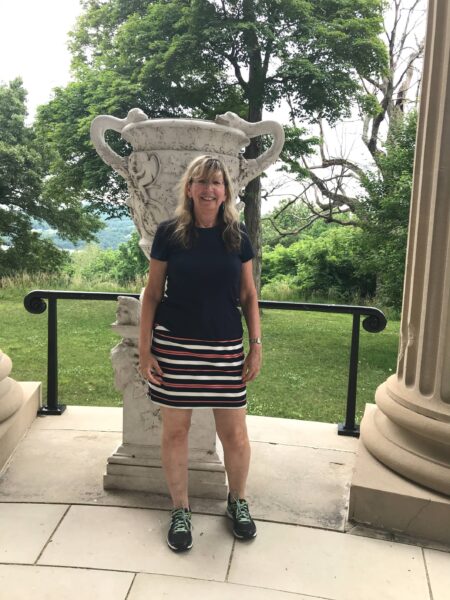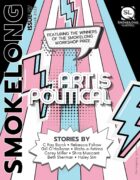Congratulations on winning first place in the annual SmokeLong Workshop Prize, Beth! I would love to know what prompt in SmokeLong Fitness generated this wonderful flash and could you possibly elaborate on your process from its start in workshop to its final iteration?
The story sprang from a writing task in A SmokeLong Summer last year. The prompt was called “No Shortcuts in Tragedy,” and included a quote from Richard Price that said, “The bigger the issue, the smaller you write.” We were instructed to pick the smallest detail and use it to give our piece resonance. My detail was mud pies. It was the first image that came to mind and I initially thought of it for the beginning, but it made more sense at the end. I asked myself what would motivate someone to shape mud, which falls apart in your hands easily, into something solid and whole? What could the mud pies symbolize? As usual, my groupmates in Smokelong Fitness gave me great feedback. For instance, in the first draft I had the father playing basketball. (This story, while fictional, contains many autobiographical details. My father did join a pick-up game while we were at a park, lost track of my whereabouts, and went home without me). They suggested I change the game to golf and once I did, the story felt a lot more cohesive.
I’m always fascinated by stories that have narrators who zoom in and out of their childhoods to show (and not show) what happened in their past and how they feel or think about their parents. Why did you settle on this particular narrative viewpoint?
This is the second story in a novella-in-flash that I’m working on. It’s narrated by a woman who feels that her life has become fragmented and out-of-control. Early on I wanted to give readers a sense of going back and forth in time, so that she could try to understand certain events in her childhood and how they relate to the person she has become. Choosing a static, stay-in-one-moment perspective wouldn’t allow me to do that. But a nonlinear approach seemed to work.
I love that your title pays off in the end and brings the story full circle. Did you want the reader to see a parallel between the narrator making golf balls from mud and the father making a “good time” life from the ether of observing other men live and be and do the things he can never live and be and do and the futility of creating something from essentially nothing?
Exactly! Thanks for that great close reading of the story. The father is caught in a trap of his own making, living a life that is quite unfulfilling. What he wants is all around him in the form of other men—in the park, on TV, at work—but he can’t bring himself to act on his feelings for them, which leaves him perpetually unhappy and frustrated. The narrator is also engaged in the futile quest of trying to get her parents’ attention and love. Her actions are misread, just as the father’s marriage can be misread. They’re alike. Ultimately, their desires tend to fall apart.
Two phrases stand out to me in your narrative: “bouquet of excuses” and “indexing his regrets.” Both of these work beautifully with the voice and for developing plot and character. Did these come naturally for you or did you have to work towards them?
Usually, lyrical writing is achieved for me in revision. I look over what I’ve written and wonder how I could say something in a more inventive, surprising way. In “Mud Pies,” both of the phrases you mention were present in the first draft. I think it’s because so many parts of this story felt autobiographical. For instance, my own father suffered from depression that most people never saw, “like black mittens tucked into the pockets of an overcoat.” I felt he was someone who spent a considerable amount of time “indexing his regrets.” As for the “bouquet of excuses” phrase, it just popped into my mind. I wish everything came to me so easily!
Finally, I would love to celebrate all of your many publications. The year is almost a quarter of the way through and you’ve had more than twenty fiction pieces published. That’s amazing! I also see that you received your PhD in 2024. How did you balance writing and studying (and I assume teaching and researching) and life?
It isn’t easy! Anyone in the process of getting a PhD knows how much time it takes to complete the degree. Mine took seven years—thirteen if you count my two master’s degrees! I also teach composition, literature, and creative writing classes at Queens College, which is time-consuming as well. And I like to make time for fun stuff, which in my case means playing tennis, gardening, and watching way too much reality TV. So, what’s the trick? I always say there are lots of better writers than me, but no one I know is more disciplined. I have a system: Write at least one story a week and submit six. It’s actually pretty doable.



 The core workshop of SmokeLong Fitness is all in writing, so you can take part from anywhere at anytime. We are excited about creating a supportive, consistent and structured environment for flash writers to work on their craft in a community. We are thrilled and proud to say that our workshop participants have won, placed, or been listed in every major flash competition. Community works.
The core workshop of SmokeLong Fitness is all in writing, so you can take part from anywhere at anytime. We are excited about creating a supportive, consistent and structured environment for flash writers to work on their craft in a community. We are thrilled and proud to say that our workshop participants have won, placed, or been listed in every major flash competition. Community works.